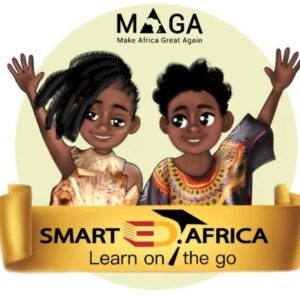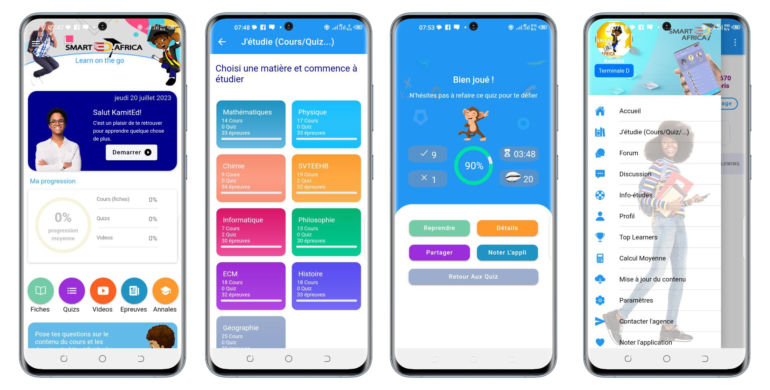Digital is now at the heart of the post-Covid world, with a strong demand for digitalization in education. In Africa, access to traditional educational resources still needs to be improved. And in many countries, primary and secondary school completion rates are alarmingly low: less than 30%! This rate is even lower for girls.
By harnessing the potential of mobile technology, Africa can overcome traditional barriers to education, such as lack of infrastructure, limited resources, and geographical constraints. With the widespread availability of smartphones and increasing connectivity across the continent, mobile learning can potentially transform education and empower learners in Africa.
mAga, in its mission to improve access to quality education, has embarked on a strategic partnership with SmartEd africa to support SmartEd africa mobile learning app and make available free of charge to all Africans.

About the SmartEd africa Initiative
SmartEd africa has developed a mobile application that blends technology and pedagogy to empower individuals with knowledge anytime and anywhere. From interactive lessons to personalized study plans, SmartEd africa ensures that learning becomes accessible and a joyful journey for all. With its innovative mobile application, SmartEd africa has revolutionized how young Africans, especially girls and women, learn and excel in school beyond the traditional classroom setting.
Currently available on Google Play, the iPhone version app is currently under development.
SmartEd africa learning app offers a wide range of services, including
- Detailed, illustrated lessons
- Self-correcting quizzes
- Corrected tests and exams
- Forums
- Gamification
Impacts of the Mobile Learning Project on African Education
This mobile learning project is a powerful tool that will impact education in Africa on several levels:
1- Equitable access to education:
Mobile education, facilitated by the innovative platform martEd Africa breaks down the geographical and economic barriers that prevent most of the vulnerable student population from accessing quality education, the fundamental pedagogical tools of books, and the knowledge disseminated by qualified teachers who, most of the time, imparted in privileged localities.
This equitable access to education is especially transformative in rural and remote areas, where educational infrastructure is often scarce.
2. Bridging the Digital Divide
Students gain valuable knowledge of information and communication technologies (ICT) by integrating mobile education into the curriculum. This inclusive approach empowers them to develop crucial digital skills necessary for their future success.
3. Accessibility for Learners With Disabilities
By harnessing the power of technology, barriers that once impeded their educational journey are now dismantled. Through the innovative SmartEd Africa mobile application, learners with disabilities can enjoy tailored learning experiences catering to their needs. This inclusive approach offers features like audio playback and contrast options, ensuring every learner is included.
4. Education for Young Girls
One of the significant impacts of this innovative platform is its effect on the education of young girls. In societies where factors like early marriage, pregnancy, or caring for young children often disrupt schooling, SmartEd Africa becomes a beacon of hope. With a mobile phone, girls can access a dematerialized school, immersing themselves in lessons, exam preparation tests, and an engaging community of learners. The power of SmartEd Africa lies in the widespread penetration of cell phones throughout Africa. It serves as a much-needed palliative for the low level of schooling among girls and women, offering a pathway to knowledge and empowerment.
Conclusion
mAga aims to empower and educate at least two million learners in the short term by deploying their mobile learning application in three African countries.
However, their vision extends far beyond that. In the medium term, mAga aspires to expand their reach to more than ten countries, positively influencing the lives of over six million learners. This is an incredible opportunity to bridge the educational gap and create a more equitable and prosperous continent.
We call for action to harness mobile learning to unlock the full potential of education and pave the way for a more equitable and prosperous continent.


